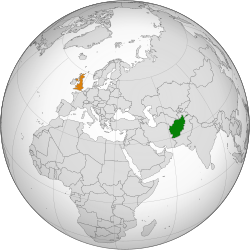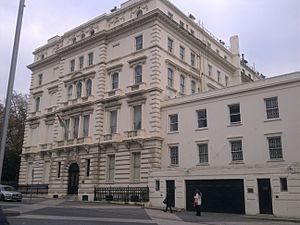Afghanistan–United Kingdom relations facts for kids
 |
|
Afghanistan |
United Kingdom |
|---|---|
| Diplomatic Mission | |
| Afghan Embassy, London | British Embassy, Kabul (closed) |
Bilateral relations of Afghanistan and the United Kingdom of Great Britain and Northern Ireland span a long and eventful history, dating back to the United Kingdom's Company rule in India, the British-Russian rivalry in Central Asia, and the border between modern Afghanistan and British India. There has been an Afghan embassy in London since 1922 though there was no accredited Afghan ambassador from 1981 to 2001.
History
British interest involves the protection of India, especially from Russia—a contest called The Great Game in the late 19th century. A series of Anglo-Afghan wars between 1839 and 1919 have historically shaped the backdrop for relations between Afghanistan and the United Kingdom. After nearly a century of Anglo-Indian influence in Afghanistan, the state was declared independent in 1919. The United Kingdom did not contribute nor actively oppose the communist led Saur Revolution, it opposed the 1979 Soviet invasion of Afghanistan and had no involvement in the series of civil wars that followed the Soviet withdrawal in 1989.
Diplomatic missions
| Embassy of Afghanistan in London | |
|---|---|
 |
|
| Location | South Kensington, London |
| Address | 31 Princes Gate, London, SW7 1QQ |
| Ambassador | Mohammad Daud Yaar |
The Embassy of Afghanistan in London is the diplomatic mission of Afghanistan in the United Kingdom. The building now used for the embassy was constructed by Charles James Freake in the late 1850s.
Earlier residents include the industrialist Charles Wright, chairman of Baldwins, and George Whiteley, 1st Baron Marchamley.
It was bought by Afghanistan in 1925.
Gallery



